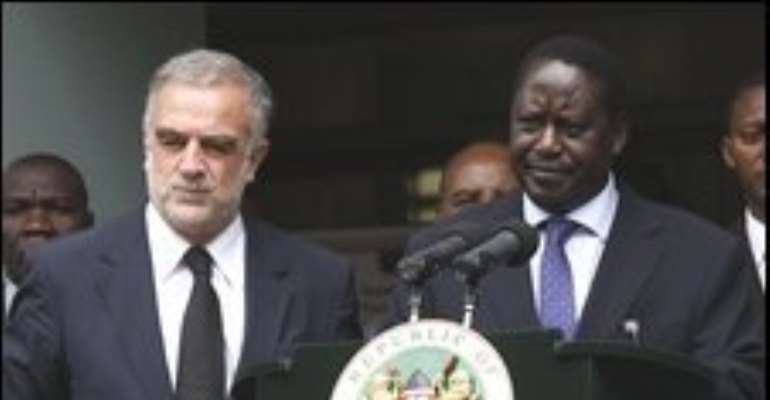TOP ICC PROSECUTOR IN KENYA TO PROBE ELECTION VIOLENCE

The Kenyan government has pledged to help the ICC with prosecutions
The chief prosecutor of the International Criminal Court has arrived in Kenya to investigate the country's post-election violence.
More than 1,300 people were killed and hundreds of thousands displaced after a disputed election in 2008.
Luis Moreno Ocampo will meet victims of the upheavals and senior government officials during his five-day tour.
It is his first visit to the country since judges at the ICC gave him the go-ahead to investigate.
Mr Ocampo, who will also meet civil society groups and the business community, suggested that as few as two or three people would be prosecuted.
'Witnesses threatened'
After 2008's disputed vote, the country imploded and powerful politicians as well as wealthy business leaders were accused of organising and fuelling attacks.
The rival politicians signed a peace deal and agreed to set up a local tribunal to investigate and prosecute the perpetrators.
But the ICC stepped in because the politicians were blocking the investigation: so far no-one has been punished.
Mr Ocampo, who flew into Nairobi on Saturday, said reports of witnesses being threatened was a “huge concern”.
Some witnesses say they have been threatened, and several have been moved out of the country for their own protection.
But the prosecutor, who says the overall goal of his mission is to ensure there is no repeat of the troubles during 2012 elections, said that his witnesses would be protected by the ICC.
“Your concern about people being threatened because they were witnesses is a huge concern,” Mr Ocampo said.
“But my problem is I cannot provide a solution because it is not my responsibility. It is the responsibility of the government of Kenya.”
When pushed, however, Mr Ocampo made it clear that while the ICC could not protect all witnesses to the violence, it would be taking its own measures to protect witnesses it intends to call.
“My witnesses will be protected. We are talking about 30, 40, 50 or 60 people,” he said.
Mr Ocampo had earlier said that politicians from both sides of the fractious coalition government were on his radar.
Many Kenyans are eagerly waiting for those names to be made public, and they hope the prosecutions will help end a deeply rooted culture of impunity.
Mr Ocampo has so far largely relied on documents gathered from other inquiries. Now he needs his own evidence, and says his investigation will last around six months.
While the ICC prosecutor gets on with his work, Kenya's politicians have been far more focused on plotting their own political futures. But some may be abruptly stopped in their tracks by Mr Ocampo.
